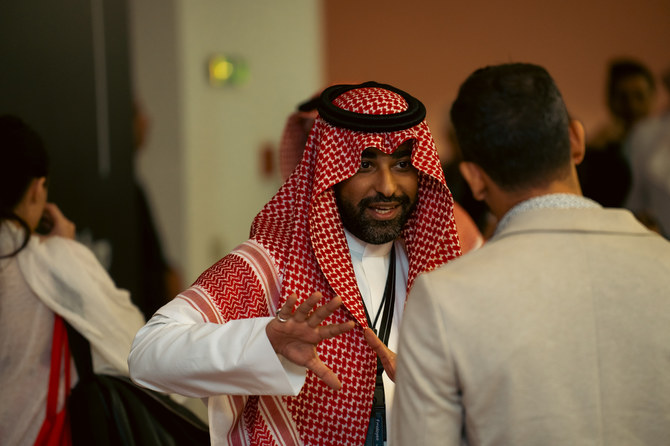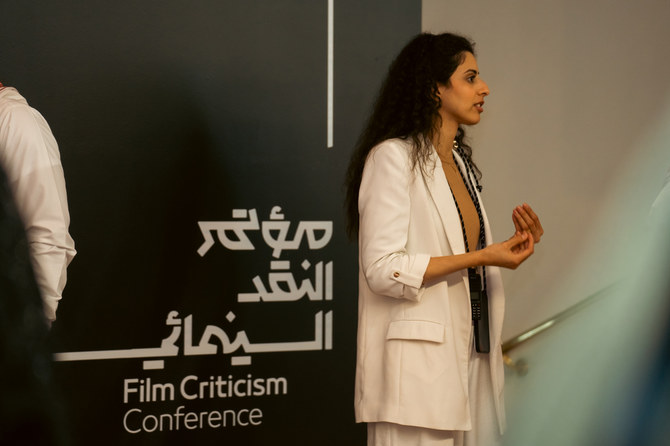RIYADH: Filmmakers and cinema enthusiasts gathered at the Cultural Palace on Thursday night for the official opening of the Film Criticism Conference, organized by the Saudi Film Commission.
The event began with a talk by Egyptian filmmaker Yousry Nasrallah, followed by a screening of his 1996 documentary “On Boys, Girls and the Veil” and a Q&A session.
Opening the event, Film Commission CEO Abdullah Al-Ayyaf said: “We need, today more than ever, a criticism movement that parallels the development of cinema, one that raises the audience’s awareness from one end and supports filmmakers and enables them to envision their works from a different perspective on the other.
“In a time when film criticism is declining in the Arab region and abroad, the need arose to initiate this conference and its forums to create balance and find a place that embraces the film scene, its ideologies and art forms, through deconstruction, analysis and comparison.”
While the official opening took place on Thursday, the conference got underway on Tuesday with the screening of several regional and international films at the Muvi Cinema on the U Walk strip.
On Thursday night, visitors were treated to an open-air screening of the Norwegian-Belgian animated film “Titina” in Kindi Square.
As well as the screenings, the conference will feature masterclasses and talks by filmmakers and industry experts from around the world. Among the topics up for discussion are the ethical dilemmas involved in documentary-making and the importance of criticism in the age of social media.
The event is accompanied by art film installations, including French artist Jean-Luc Godard’s “The Image Book,” Laia Cabrera and Isabelle Duverger’s “Dream-e-scape” and Kuwaiti Haya Alghanim’s “Two Captains Sink the Ship.”
Other activities, including workshops, are designed to appeal to younger audiences.
Saudi director and producer Majeed Saud told Arab News: “I think criticism is one of the pillars of cinema and without it the industry would be at a standstill.
“This conference is such a positive step that’s beneficial to any filmmaker and also in developing the Saudi cinema through criticism.”
Saudi director Khalid Fahad, whose film “Valley Road” is among those being screened, told Arab News that the conference was vital in developing an environment for film criticism.
“The most we have in Saudi are viewers and reviewers. We don’t have true critics,” he said.
“So, this is a mark of new beginnings for filmmakers to broaden their horizons and begin to understand. I think many people are interested in criticism or have that capability but haven’t explored it yet, so these conferences will hold a spotlight on them and help them find themselves.”
The conference runs until Tuesday.
The art of analysis: Film Criticism Conference opens in Riyadh
https://arab.news/ycjw2
The art of analysis: Film Criticism Conference opens in Riyadh

- Event aims to ‘embrace film … through deconstruction, analysis and comparison,’ organizer says
- Weeklong conference features screenings, workshops, discussions
Civil defense warns of heavy rains, potential flooding across Saudi Arabia

- Makkah and Riyadh regions forecast to have moderate to heavy rain
RIYADH: Saudi Arabia’s General Directorate of Civil Defense has warned against heavy rainfall and potential flooding in multiple regions across the Kingdom until Tuesday.
In an advisory carried by the Saudi Press Agency, the directorate said Makkah region is expected to experience moderate to heavy rainfall, accompanied by hail and strong winds.
Moderate to heavy rain are also expected in Riyadh region, while Najran in the southwest may experience lighter rainfall.
Also expected to experience rainfall are the western regions of Madinah, Al-Baha, Asir, and Jazan; the central region of Qassim; Hail and Northern Borders in the north; and the Eastern Province region.
“Residents are advised to take necessary precautions, avoid flood-prone areas, and adhere to safety guidelines shared via various media channels,” the Civil Defense advisory said.
How Saudi schools are using AI to personalize learning and streamline administration

- AI tools help students with disabilities through speech-to-text, adaptive interfaces, and screen-reading technologies
- Educators’ roles are evolving as AI handles tasks like grading and performance tracking, freeing teachers to focus on mentoring
RIYADH: As Saudi Arabia forges ahead with its Vision 2030 initiative, artificial intelligence is becoming a cornerstone of its education reform.
Across the Kingdom, AI technologies are reshaping classrooms — personalizing learning, streamlining administration and helping students of all abilities engage with their studies in new ways.

“AI technology has significantly changed the way many students, including myself, approach studying and managing coursework,” Abdullah Mohammed, a law student at Imam Mohammad ibn Saud Islamic University, told Arab News.
“Tools like AI tutoring systems and study apps have made learning more efficient, personalized and accessible.”
While Mohammed said AI tools have enhanced his learning experience, he also acknowledged the need for caution.
“Some AI tools provide quick solutions without much depth, so if I’m not careful, I might miss the critical thinking part of the learning process,” he said.

Ultimately, however, Mohammed said he is confident AI has better prepared him for the job market.
The strategic alignment between AI and Vision 2030 is clear, according to Abdulrahman Al-Motrif, professor of information technology and educational computing at King Saud University.
“AI supports the goals of Vision 2030 by enabling personalized learning, optimizing resource management and facilitating access to quality education regardless of geographic location,” he told Arab News.
“AI systems can analyze student performance in real-time, allowing educators to tailor instruction to individual learning needs, thereby enhancing student outcomes and supporting the Kingdom’s ambition to cultivate a future-ready workforce.”
Al-Motrif also highlighted AI’s role in promoting inclusive education.
“AI reinforces Vision 2030’s emphasis on equity, accessibility, and lifelong learning by reaching remote communities and students with special needs,” he said.
This demonstrates AI’s impact not just as a technological innovation, but also as a powerful force for social transformation.
Leading platforms like Alef Education and Classera are already putting this vision into practice. Using real-time analytics, they adapt content to each student’s learning style, proficiency and pace.

A study by Alef Education found that students using AI-enhanced platforms achieved a 25 percent improvement in academic performance over just one semester — strong evidence of AI’s ability to boost outcomes through personalized learning.
Crucially, AI is helping make education more accessible. In Saudi Arabia’s diverse learning landscape, tools such as speech-to-text software, adaptive interfaces and real-time assessments are opening doors for students with disabilities.
At King Saud University, collaborations with AI developers have produced tools for visually impaired students, converting written content into audio and using advanced screen-reading technology.
“AI has transformed the learning environment into a more interactive and engaging space,” said Al-Motrif. “Gamified learning platforms and intelligent tutoring systems provide immediate feedback and customized challenges.”

These innovations not only enhance academic performance, but also spark motivation and sustained engagement among learners.
AI is also streamlining back-end operations. Platforms like Madrasati now use AI to monitor attendance, track engagement and assess academic progress, freeing educators to focus more on teaching and mentoring.
Yet AI is not replacing teachers — it is redefining their roles.
“In AI-supported classrooms, educators serve as facilitators, mentors and human connectors in an increasingly digital ecosystem, using AI-generated insights to identify learning gaps,” said Al-Motrif.

Still, challenges remain. One significant obstacle is the shortage of Arabic-language content online — making up only 1.2 percent of global digital resources — which limits the effectiveness of AI systems trained on data-rich environments.
To fully realize AI’s benefits, Saudi Arabia must invest in digitizing traditional materials, promoting Arabic content creation and partnering with AI firms to develop language-specific algorithms.
Some institutions are already leading the way. Imam Abdulrahman bin Faisal University and King Abdulaziz University have adopted AI-powered systems to personalize instruction and track student performance, leading to higher satisfaction and retention rates.
These successes show that AI is not merely a technological upgrade — it is a catalyst for reimagining education.

By leveraging AI thoughtfully, Saudi Arabia has a unique opportunity to deliver high-quality, personalized and inclusive education while advancing its Vision 2030 goals.
But achieving this future will require more than just technology. It will demand investment, collaboration and a commitment to ensuring that innovation, pedagogy and policy move forward together.
With sustained effort, AI could become the foundation of a dynamic, future-ready education system — one that prepares all learners for the opportunities of the digital age.

Saudi FM discusses issues of common interest with Peruvian counterpart

RIYADH: Saudi Foreign Minister Prince Faisal bin Farhan received his Peruvian counterpart Elmer Schialer Salcedo and the country’s Minister of Mines and Energy Jorge Montero in Riyadh on Thursday.
During the meeting, Saudi-Peruvian relations, aspects of joint cooperation in various fields, and a number of international issues of common interest were discussed, Saudi Press Agency reported.
Cameroon joins Islamic Military Counter Terrorism Coalition

- Cameroon becomes 43rd member state of the Saudi-led coalition
The Islamic Military Counter Terrorism Coalition announced that Cameroon has officially joined, becoming the 43rd member state of the coalition, led by the Kingdom of Saudi Arabia.
The step underscores a growing commitment to combating terrorism and fostering regional and international security and stability, the Saudi Press Agency reported on Thursday.
The announcement was made during an official ceremony at the coalition’s headquarters in Riyadh, where the flag of Cameroon was raised alongside the flags of the 42 member states; a powerful symbol of unity and solidarity in the fight against terrorism.
The event was attended by Maj. Gen. Mohammed bin Saeed Al-Moghedi, acting secretary-general of the IMCTC, Iya Tidjani, Cameroon’s ambassador to Saudi Arabia, the Cameroonian representative to the coalition, a delegation from Cameroon’s embassy, and representatives of member states.
Al-Moghedi welcomed Cameroon’s admission to the coalition, describing it as a significant step that strengthens joint efforts to combat terrorism and enhances coordination and integration in the intellectual, media, financial, and military fields.
Makkah Municipality approves 3,149 housing permits for Hajj

- This step comes as part of the ongoing efforts to provide pilgrims with a safe and comfortable housing environment
MAKKAH: Makkah Municipality approved 3,149 official housing permits for this year’s Hajj season, following the completion of all required technical and regulatory conditions.
This step comes as part of the ongoing efforts to provide pilgrims with a safe and comfortable housing environment.
The municipality said that the main technical and regulatory requirements include: ensuring compliance with building permits and approved architectural plans; reviewing safety reports, emergency staircases and generators; verifying maintenance contracts and training workers on safety standards; reviewing and approving the establishment’s records and ensuring their consistency with aerial photographs; and fully complying with safety forms among others.
Makkah officials continue efforts to ensure the highest degrees of technical and regulatory readiness to provide the best possible experience during this year’s pilgrimage.

























